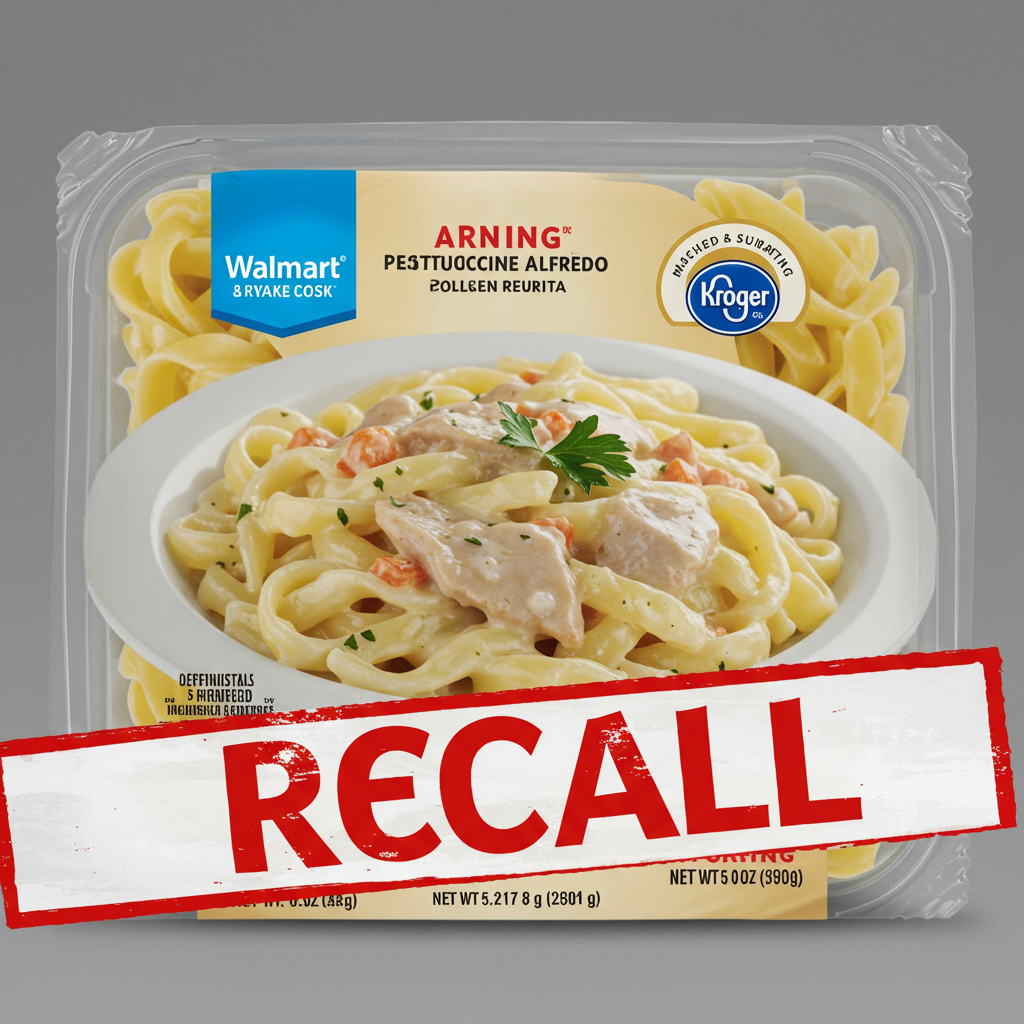Urgent Food Recall: Chicken Fettuccine Sold at Walmart and Kroger Linked to Listeria Outbreak
Federal health officials have issued a significant warning regarding a Listeria outbreak tied to specific ready-to-eat chicken fettuccine Alfredo meals sold at Walmart and Kroger stores nationwide. The outbreak has resulted in severe health consequences, including three confirmed deaths, 17 illnesses, 16 hospitalizations, and one pregnancy loss across 13 states.
The affected products were produced by FreshRealm, a company with facilities in California, Georgia, and Indiana. The company has voluntarily recalled certain chicken fettuccine Alfredo items made before June 17, 2025, “out of an abundance of caution” following the detection of the outbreak strain of Listeria monocytogenes.
Which Products Are Recalled?
Consumers are urged to check their refrigerators and freezers immediately for the following products, which were sold in the refrigerated section:
Marketside Grilled Chicken Alfredo with Fettuccine (32.8-ounce tray packages) with a best-by date of June 27, 2025, or prior. This product contains tender pasta with creamy Alfredo sauce, white meat chicken, and shaved Parmesan cheese.
Marketside Grilled Chicken Alfredo with Fettuccine (12.3-ounce tray packages) with a best-by date of June 26, 2025, or prior. This smaller tray includes white meat chicken, broccoli, and shaved Parmesan cheese along with the pasta and sauce.
Home Chef Heat & Eat Chicken Fettuccine Alfredo (12.5-ounce tray packages) with a best-by date of June 19, 2025, or prior. This meal features pasta, grilled white meat chicken, and Parmesan cheese.
Look for the establishment numbers “EST. P-50784,” “EST. P-47770,” or “EST. P-47718” on the side of the packaging to help identify recalled items.
Understanding the Outbreak and Its Impact
Illnesses linked to this outbreak have been reported between July 2024 and May 2025. Cases have occurred in Florida, Illinois, Indiana, Louisiana, Michigan, Minnesota, Missouri, North Carolina, Nevada, Ohio, South Carolina, Texas, and Virginia. Tragically, the three deaths occurred in Illinois, Michigan, and Texas. Health officials note that the actual number of people sickened may be higher, and more cases could be reported.
The U.S. Department of Agriculture’s Food Safety and Inspection Service (FSIS), along with the U.S. Food and Drug Administration (FDA) and the Centers for Disease Control and Prevention (CDC), are actively investigating the source of contamination. The outbreak strain was detected in a sample from a FreshRealm facility during routine testing, though that specific product lot was reportedly destroyed and not shipped. Investigations are ongoing to determine if the contamination originated within a production facility or from an ingredient supplied by a vendor. Officials used analysis of retail shopper records and interviews with sick individuals to link the outbreak to the recalled products.
What Should Consumers Do?
If you have purchased any of the recalled chicken fettuccine Alfredo products, DO NOT CONSUME THEM. Even if the product appears unspoiled, it could still be contaminated with Listeria monocytogenes.
Discard the product immediately.
Alternatively, return the product to the place of purchase (Walmart or Kroger) for a full refund.
Clean any surfaces in your refrigerator, freezer, or kitchen that may have come into contact with the recalled meals, as Listeria can spread easily.
The Dangers of Listeria Infection (Listeriosis)
Consuming food contaminated with Listeria monocytogenes can cause listeriosis, a serious and potentially fatal infection. Symptoms can include:
Fever
Muscle aches
Headache
Stiff neck
Confusion
Loss of balance
Convulsions
These symptoms can sometimes be preceded by diarrhea or other gastrointestinal issues.
While healthy individuals may experience only mild symptoms or no symptoms at all, Listeria poses a significant danger to certain vulnerable populations:
Pregnant Women: Listeria infection during pregnancy can lead to serious complications, including miscarriage, stillbirth, premature delivery, or life-threatening infections in newborns.
Older Adults: Individuals aged 65 and over are at higher risk for severe infection.
People with Weakened Immune Systems: Those with conditions like cancer, diabetes, kidney disease, or HIV/AIDS are particularly vulnerable.
If you are in a high-risk group and experience flu-like symptoms within two months of eating a potentially contaminated product, seek medical attention immediately and inform your healthcare provider about the recall and the food you consumed. Listeriosis is typically treated with antibiotics.
The ongoing investigation aims to prevent further illnesses and ensure the safety of the food supply. Consumers are urged to heed the recall notice and take necessary precautions.




